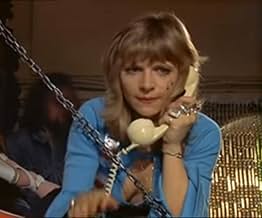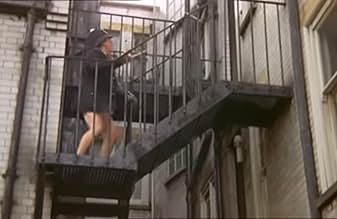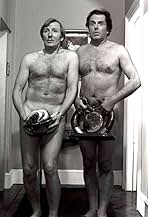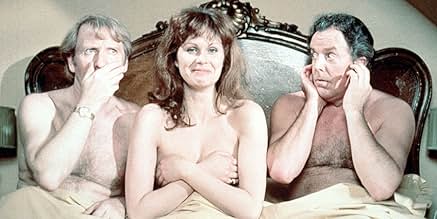Based on the hit play. A British Government Minister puts forward a bill to battle filth in the UK but that doesn't stop him having an affair with both his secretary, Miss Parkyn and Wendy, ... Read allBased on the hit play. A British Government Minister puts forward a bill to battle filth in the UK but that doesn't stop him having an affair with both his secretary, Miss Parkyn and Wendy, the wife of a high-up reporter. Opponents to the bill - mainly some hippy girls, lead by J... Read allBased on the hit play. A British Government Minister puts forward a bill to battle filth in the UK but that doesn't stop him having an affair with both his secretary, Miss Parkyn and Wendy, the wife of a high-up reporter. Opponents to the bill - mainly some hippy girls, lead by Johnny, kidnap the Minister's best friend and co-founder of the bill, Barry Ovis just as he... Read all
Storyline
Did you know
- TriviaJoanna Lumley, who also appeared in the stage version, describes the filming as having to be done in 'a basement off Fleet Street, more horrific than The Exorcist (1973) it was!'
- Quotes
Insp. Ruff: Well, well well, it seems the bird has flown, eh? So, we've got a right lot of names for our adress book. Take them down, sergeant. Oh, Charlie, no phone numbers, eh?
Police sergeant: No, sir.
- ConnectionsReferences Come Dancing (1949)
"Don't Just Lie There, Say Something" reflects the long-standing British obsession with the sexual misdeeds of their politicians, especially those politicians who preach one thing and practise another, an obsession going back at least to the Profumo affair in 1963. The film came out in 1973, the same year as another notorious scandal which saw two Government ministers, Antony Lambton and Lord Jellicoe, forced to resign from office because of their involvement with prostitutes.
The central character is Sir William Mannering-Brown, a Home Office minister who has introduced into Parliament a controversial Bill imposing stricter controls over sex and violence in the media, even though he is himself an inveterate womaniser. The trouble starts when Sir William's inept, bumbling deputy Barry Ovis is kidnapped on his way to his wedding by a group of anarchist hippies opposed to the Bill. (Were the scriptwriters aware, I wonder, that "ovis" is Latin for "sheep"?) Ovis manages to escape from his kidnappers and takes refuge in Sir William's London flat, unaware that his boss is using it for an assignment with his glamorous but mercenary secretary Giselle Parkyn, whose main concern is to persuade Sir William to award lucrative Government contracts to her father's sausage-manufacturing business.
Bawdy comedy was very much a mainstay of the British film industry in the seventies, but "Don't Just Lie There " is rather different in style to films such as the "Carry On" series, which depended heavily on suggestive innuendo. It has been said that the difference between comedy and farce is that the writer of farce does not need a sense of humour, merely a sense of strict mathematical logic. Although there is some bawdy wordplay such as obvious doubles entendres on the word "pussy" or the expression "have it off", most of the humour in "Don't Just Lie There " is of the strictly mathematical sort. The plot arises from Sir William's desperate attempts to hide evidence of his misconduct from Ovis, Giselle, his other mistress Wendy, the hippies, an officious police officer, an elderly opposition politician, his wife Birdie and Ovis's fiancée Jean.
There are some familiar (at least in Britain) faces in this film. Leslie Phillips, with his sandy colouring and foxy features, was far from conventionally handsome, but he seemed to make a career out of playing smooth but lecherous cads, and Mannering-Brown falls firmly in this category. Brian Rix similarly made a career (although more on stage than on film) of playing bumbling idiots who normally ended up losing their trousers (as Ovis does more than once). Joanna Lumley (Giselle), with her classic English Rose beauty and seductive speaking voice, was regarded as one of the most promising British newcomers of the early seventies. (She has gone on to become one of the most familiar faces on British television, although her film career has been rather patchy). Joan Sims (Birdie) was a regular star of the "Carry On" films, where she also often played formidable wives pursuing errant husbands.
The presence of all these stars, however, is not enough to save this film. The frantic antics of the cast- most of the action consists of people in various states of undress hiding in, or under, beds, in cupboards or outside windows- are never amusing. The few effective moments, in fact, come when the film relies on verbal rather than physical humour, such as the scene where Sir William, speaking to the policeman, is desperately trying to concoct an explanation as to why he is in bed with Ovis and then, when she betrays her presence by sneezing loudly under the covers, why Giselle is with them. Farce was a popular genre in the British theatre at the time, although it has lost its popularity since, and even in the seventies it never seemed to transfer well from the stage to the screen. ("No Sex Please, We're British" was one of the longest-running West End hits of the decade, a fact that will baffle anyone who has seen the film version). At the time "Don't Just Lie There " seems to have been well received- it even spawned a TV spin-off called "Men of Affairs"- but today it looks like a horribly dated period piece. 4/10
- JamesHitchcock
- Mar 4, 2007
- Permalink
Details
- Release date
- Country of origin
- Language
- Also known as
- Raptaram o Secretário
- Filming locations
- Gannet Studios, London, England, UK(studio: made at)
- Production companies
- See more company credits at IMDbPro
Contribute to this page





























